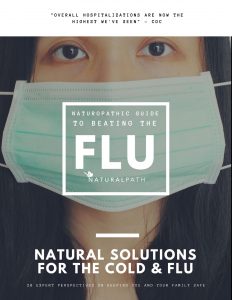Cold and Flu Survival Guide: Top 5 tips to keep you and your family healthy during cold and flu season
 As the days get shorter and the weather turns colder, I start to see more patients wanting help preventing, or treating flu and colds. Many come for immediate help with respiratory or gastrointestinal infections, but many come in wanting to know how to prevent getting sick.
As the days get shorter and the weather turns colder, I start to see more patients wanting help preventing, or treating flu and colds. Many come for immediate help with respiratory or gastrointestinal infections, but many come in wanting to know how to prevent getting sick.
Treat The Terrain First
First and foremost, I would say that attending to the terrain of the body is the most important factor in staying healthy. We have all heard about Louis Pasteur and the germ theory but few of us have heard of Antoine Bechamp’s cell theory or Claude Bernard’s concept of terrain. All 3 men were contemporaries working on the same subject but with vastly differing approaches. While Pasteur put illness as the result of the microbe, Bechamp and Bernard put the terrain of the body as the most important factor in whether a person will get ill. They argued that the soil, or terrain, in which the disease is grown in is more important than the microbe. If the terrain is imbalanced then we fall ill to microbial infections. It is not the influenza virus that is making us sick but rather our bodies inability to defend against the flu virus that renders us ill. Once we see the importance of the terrain of the body, we see that a healthy lifestyle is more effective at fighting the flu than any herb or pharmaceutical medicine can be.
“The terrain is everything, the germ is nothing.” Claude Bernard
1|Eat Well
Eating a varied diet filled with fiber rich vegetables, legumes, beans and fruits provides nutrients and phytochemicals that are necessary for a healthy immune system. Vitamin D3, vitamin A, vitamin C and zinc are powerful players against infections like viruses and bacteria. Research published in 2010 in the American Journal of Clinical Nutrition found that vitamin D3 supplementation in children decreased the rate of influenza infection by 50% which is far better than the effects of vaccines or antiviral drugs. (1) A recent study released this year concluded that vitamin D3 supplementation is protective against respiratory infections. (2) Research released in 2011 showed that vitamin A is necessary for a multitude of different immune responses to both bacteria and viruses. (3) Vitamin A is also associated with T cell function, making it a vital component of a healthy immune system. (4) Vitamin A maintains the integrity of mucus membranes, which are at the front line of our defenses against viral, bacterial, and parasitic infections. (5) In controlled trials Vitamin C has been shown to aid in the prevention of influenza, as well as shortening the duration and reducing the severity of infections already contracted. (6) Low levels of zinc are associated with a decrease in T cell function, a vital white blood cell that helps fight infections.
A diet filled with fiber rich veggies provides health promoting nutrients, phytochemicals and antioxidants as well as fiber to maintain a healthy gut microbiome. Winter is the perfect time to add more vitamin A to our diets with sweet potatoes, carrots, dark leafy greens and butternut squash. Both vitamin A and vitamin D3 are fat soluble vitamins that can accumulate over time, so you want to be sure to have the right age appropriate dose for you and your child if you choose to supplement. Studies have shown that eating a sugary snack or meal can depress the immune system for several hours, creating a window of time during which it is easier to get the flu. (7,8) Getting enough fiber rich vegetables and avoiding excessive sugar can help keep the immune system working at the level needed to fend off infections.
2|De-Stress
With our hectic schedules, stress is a part of everyday life but excessive or chronic stress can decrease immune function and make it easier to come down with an infection. (9,10) While regular exercise helps bolster immune function, scheduling down time or rest into you and your family’s day can actually help the immune system fight infections. Establishing stress management techniques like deep breathing, exercise, yoga or meditation can help prevent every day stress from leaving you vulnerable to the flu. (11)
“Specifically, mindfulness meditation appears to be associated with reductions in pro-inflammatory processes, increases in cell-mediated defense parameters, and increases in enzyme activity that guards against cell aging.”
3|Get Sleep
Adults need an average of 7 to 10 hours of sleep nightly while children, depending on their age, need anywhere from 9 to 14 hours of sleep each night to rejuvenate for the next day. Not getting enough sleep lowers the body’s defenses needed for fighting infections. (12)
4| Elderberry
Recent studies demonstrate that elderberry extract has immune-modulating and antioxidant properties that offset the activity of viruses so they can no longer enter the cell and replicate. (13,14) The berries also contain vitamins A and C, and the flavonoids quercetin, anthocyanin and rutin, all of which boost immune function. Elderberry comes in a great tasting liquid syrup form making it an easy option for kids. We put a teaspoon or so in seltzer water and the kids think elderberry sodas are a total treat!
5| Get In Nature
Spending time in nature has been shown to boost the parts of the immune system associated with fighting infections. Improvement in recovery rates and increasing infection fighting cells have been found in patients who were immersed in nature. (15) Researchers have also recently found an antibiotic in soil that is effective against bacterial infections. (16) Whether it’s the influence of nature on our nervous systems, or the direct influence of the microbes in nature, getting out in nature regularly is a perfect tool for staying healthy during cold and flu season.
 Protect yourself and your family from the cold and flu season
Protect yourself and your family from the cold and flu season
With flu season at its peak, we have invited some of the top naturopathic physicians from NaturalPath and Naturopathic Doctor News & Review to share natural ways to prevent and heal from the flu.
In this guide you will learn:
– How to prevent the flu in your home
– Foods and supplements that can fight the virus
– Expert advice from leading physicians on how to treat the flu
– Understand the signs on when it is time to see your doctor
– The purpose behind your child’s fever and why you shouldn’t try to bring it down, sometimes
Get the Free PDF, Naturopathic Solutions for the Cold and Flu, Here!
URL: http://thenatpath.pages.ontraport.net/flu-guide
References:
(1) Urashima M1, Segawa T, Okazaki M, Kurihara M, Wada Y, Ida H. Randomized trial of vitamin D supplementation to prevent seasonal influenza A in schoolchildren. Am J Clin Nutr. 2010 May;91(5):1255-60. doi: 10.3945/ajcn.2009.29094.
(2) Adrian R Martineau, David A Jolliffe, Richard L Hooper, Lauren Greenberg, et al. Vitamin D supplementation to prevent acute respiratory tract infections: systematic review and meta-analysis of individual participant data. BMJ, 2017; i6583 DOI: 10.1136/bmj.i6583
(3) Hall JA, Grainger JR, Spencer SP, Belkaid Y. The Role of Retinoic Acid in Tolerance and Immunity. Immunity. 2011;35(1):13-22. doi:10.1016/j.immuni.2011.07.002.
(4) Mora JR, Iwata M, von Andrian UH. Vitamin effects on the immune system: vitamins A and D take centre stage. Nature reviews Immunology. 2008;8(9):685-698. doi:10.1038/nri2378.
(5) Fan X, Liu S, Liu G, Zhao J, Jiao H, Wang X, et al. (2015) Vitamin A Deficiency Impairs Mucin Expression and Suppresses the Mucosal Immune Function of the Respiratory Tract in Chicks. PLoS ONE10(9): e0139131.
(6) Hemilä H1, Chalker E. Vitamin C for preventing and treating the common cold. Cochrane Database Syst Rev. 2013 Jan 31 (1):CD000980. doi: 10.1002/14651858.CD000980.pub4.
(7) Sanchez A, Reeser JL, Lau HS, Yahiku PY, Willard RE, McMillan PJ, Cho SY, Magie AR, Role of sugars in human neutrophilic phagocytosis. Am J Clin Nutr. 1973;26:1180–1184.
(8) Sorensen LB, Raben A, Stender S, Astrup A. Effect of sucrose on inflammatory markers in overweight humans. Am J Clin Nutr. 2005;82:421–427.
(9) J.K. Kiecolt-Glaser, W. Garner, C. Speicher, G.M. Penn, J. Holliday, R. Glaser, Psychosocial modifiers of immunocompetence in medical students. Psychosom Med. 1984 Jan-Feb;46(1):7-14.
(10) Ashcraft KA, Bonneau RH. Psychological stress exacerbates primary vaginal herpes simplex virus type 1 (HSV-1) infection by impairing both innate and adaptive immune responses. Brain, behavior, and immunity. 2008;22(8):1231-1240. doi:10.1016/j.bbi.2008.06.008.
(11) Black DS, Slavich GM. Mindfulness meditation and the immune system: a systematic review of randomized controlled trials. Annals of the New York Academy of Sciences. 2016;1373(1):13-24. doi:10.1111/nyas.12998.
(12) Ibarra-Coronado EG, Pantaleón-Martínez AM, Velazquéz-Moctezuma J, et al. The Bidirectional Relationship between Sleep and Immunity against Infections. Journal of Immunology Research. 2015;2015:678164. doi:10.1155/2015/678164.
(13) Tiralongo E, Wee SS, Lea RA. Elderberry Supplementation Reduces Cold Duration and Symptoms in Air-Travellers: A Randomized, Double-Blind Placebo-Controlled Clinical Trial. Nutrients. 2016;8(4):182. doi:10.3390/nu8040182.
(14) Barak V1, Halperin T, Kalickman I. The effect of Sambucol, a black elderberry-based, natural product, on the production of human cytokines: I. Inflammatory cytokines. Eur Cytokine Netw. 2001 Apr-Jun;12(2):290-6.
(15) Li Q. Effect of forest bathing trips on human immune function. Environmental Health and Preventive Medicine. 2010;15(1):9-17. doi:10.1007/s12199-008-0068-3.
(16) Losee L. Ling, Tanja Schneider, Aaron J. Peoples, Amy L. Spoering, et al. A new antibiotic kills pathogens without detectable resistance. Nature 517,455–459,22 January 2015
Image Copyright: <a href=’https://www.123rf.com/profile_oksun70′>oksun70 / 123RF Stock Photo</a>
 Catherine Clinton ND, is a board-licensed naturopathic doctor and graduate of NCNM in Portland, OR. She currently practices at her private clinic in Eugene, OR. Catherine lectures on integrative medicine and gut health and has authored several publications in these areas. During medical school, Catherine was diagnosed with a GI autoimmune disease, which stimulated an special interest in gastrointestinal and immune health. Her own journey to health has helped to inspire her patients as well as her writing. With the birth of her own children, Catherine’s passion extended to the GI and immune health of all children. Catherine’s blog can be found at www.wellfuture.com/blog, or you can follow her at Facebook (https://www.facebook.com/dr.catherineclintonnd/) and Twitter (@DrCatherineND).
Catherine Clinton ND, is a board-licensed naturopathic doctor and graduate of NCNM in Portland, OR. She currently practices at her private clinic in Eugene, OR. Catherine lectures on integrative medicine and gut health and has authored several publications in these areas. During medical school, Catherine was diagnosed with a GI autoimmune disease, which stimulated an special interest in gastrointestinal and immune health. Her own journey to health has helped to inspire her patients as well as her writing. With the birth of her own children, Catherine’s passion extended to the GI and immune health of all children. Catherine’s blog can be found at www.wellfuture.com/blog, or you can follow her at Facebook (https://www.facebook.com/dr.catherineclintonnd/) and Twitter (@DrCatherineND).
